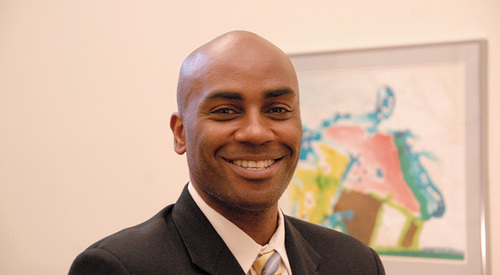
Ernest Morrell — expert in critical educational theory, social movement theory, English education and African diaspora popular culture — has been appointed Coyle Professor in Literacy Education and inaugural director of the Center for Literacy Education in the University of Notre Dame’s Institute for Educational Initiatives. He will join the faculty in fall 2017, holding joint appointments in the Department of English and the Department of Africana Studies.
The new Center for Literacy Education will foster collaboration between the institute’s English education faculty and the College of Arts and Letters with a goal to transform literacy scholarship and practice in today’s urban and multicultural urban schools.
“This is an incredible opportunity to tie together the work of the English and Africana Studies departments and IEI,” Morrell said.
Morrell was most recently the Macy Professor of English Education at Columbia University’s Teachers College and was the director of Columbia’s Institute for Urban and Minority Education (IUME).
He is the author of several books, including “Critical Media Pedagogy: Teaching for Achievement in City Schools,” which won Choice Magazine’s Outstanding Academic Title Award in 2014.
“Ernest is an inspiring example of a talented and selfless person with a passion for helping others, especially children,” said Thomas G. Burish, Charles and Jill Fischer Provost. “His expertise, leadership, and commitment to Notre Dame’s faith-based mission, combined with his exceptional research, teaching, and administrative skills, will add tremendously to our University.”
“Ernest is a tremendous addition to our faculty,” said John T. McGreevy, the I.A. O’Shaughnessy Dean of the College of Arts and Letters. “His record of high-quality teaching and scholarship on matters of central concern at Notre Dame will inspire faculty and students alike.”
Morrell is serving a three-year term on the American Educational Research Association’s Executive Committee (AERA), where he is also a fellow. He has been president of the National Council of Teachers of English and a member of the International Literacy Association and the ILA’s Literacy Research Panel.
Morrell said he was drawn to Notre Dame because of the way he will be able to make his faith a driving force behind his teaching and research.
“One of the disconnects in my career has been thinking about my professional self and my Christian self. There have been times when it doesn’t seem like those selves can come together at the modern university,” he said.
That disconnect carries over into research.
“When we’re thinking about work in schools, we’re missing a lot if we only focus on public schools,” he said. “The possibility of expanding work to include Catholic schools, to connect faith and mission to pedagogy — we should not have to trade faith for intellectual rigor.”
“You want to move the needle in class and fundamentally change classroom practice,” Morrell said. “We have an opportunity to create dialogue across different disciplines. It sounds like an ambitious agenda, but we certainly have the people in place to do it.”
“Ernest’s leadership has been indelibly shaped by his passion, his tireless work ethic and his natural graciousness,” said Rev. Timothy R. Scully, C.S.C., the Hackett Family Director of the Institute for Educational Initiatives. “His work will allow the University to have a transformative impact on the way we understand and teach marginalized children.”
Contact: Theo Helm, ACE, 336-918-9314, thelm1@nd.edu